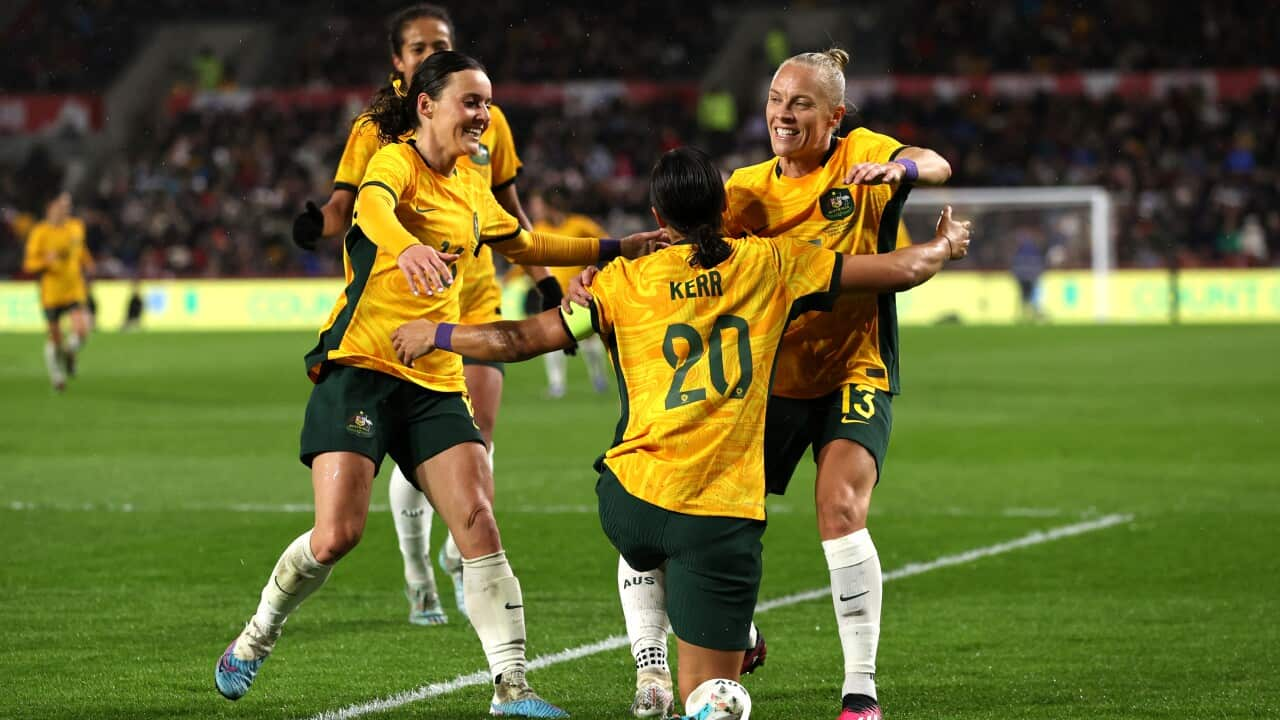Oscar Stubbs has been playing sports ever since he can remember and follows his favourite teams just as avidly.
The 22-year-old athlete from Blacktown in Sydney was born with an eye disorder that causes severe short-sightedness and pinhole vision.
He represents Australia in blind cricket, swimming and vision-impaired futsal, an indoor version of football. But when it comes to being a spectator, he often relies on a mate or family member to help him follow the action and tries to sit near the stadium screen.
“I love my sports, I go to whatever I can, whenever I can because nothing beats live sport. The atmosphere is amazing, but for someone like me, it’s a bit hard to see what's happening on the field,” he said.
“Everybody reacts around us when something’s happened in the game, but we don’t really know what’s happened until the replay.”

Courtney Webeck and Oscar Stubbs will be making use of Audio Descriptive Commentary at the FIFA Women's World Cup. Source: Supplied
For the first time in Australia, Audio Descriptive Commentary (ADC) for blind or vision-impaired football fans will be available at some live matches.
With just an app and a pair of headphones, supporters will be able to follow the action from the stands through real-time commentary, designed especially for those with limited sight.

Audio Descriptive Commentary was used at the men's FIFA World Cup in Qatar last year. Credit: FIFA/qatar2022.qa
“Just being able to know what’s going on at the exact time instead of nagging someone around us… that would be amazing.”
Being able to know what’s going on at the exact time instead of nagging someone around us … that would be amazing.- Oscar Stubbs, football fan
His friend and fellow athlete Courtney Webeck agrees. She was born legally blind and is Australia’s current blind and low-vision tennis champion.
The 19-year-old from the NSW town of Gloucester said Audio Descriptive Commentary could be “life-changing”.
“I always use my phone to just zoom in and take a picture. Having that description there, I won’t have to take that. I just get to live in the moment and be no different to anyone else sitting in the grandstand.
“I think it’s really good that it’s a female sport that’s starting off in Australia ... that’s a huge thing. As a vision-impaired girl, to see the Matildas take on the top in the world would be amazing.”
How does Audio Descriptive Commentary work?
Unlike TV, or even radio commentary, Audio Descriptive Commentary focuses on describing each movement of the ball in relation to the rest of the field and the key moves of players. The commentary can include players' body language, clothing and facial expressions, and even fan and coach behaviour.
"You’re their eyes,” said David Feeney, a Sydney-based football fan and IT consultant who received training in delivering Audio Descriptive Commentary for the FIFA Women’s World Cup.
“So as the ball is moving around the field, their heads will actually move. You’ve got to tell them where the ball is. You’ve got to tell them what’s happening,” he said.

David Feeney has been trained in delivering Audio Visual Commentary for vision-impaired sports fans. Source: Supplied
“You’re trying to make sure that they feel they’ve been totally involved in the game, and they can have a conversation with their friend or relative and actually feel comfortable that what they're saying happened.”
He recalls a training exercise where he had to draw the movement of the ball on a whiteboard based purely on the descriptive commentary of another trainee, without seeing the game itself.
“Certainly, for me it really crystallised, there really are a few people here and they don’t know where the ball is unless you describe exactly where it is.”
While Audio Descriptive Commentary will be new to Australia, it’s been available at some live football matches for around 20 years.
Alan March Sport is the company behind the Audio Descriptive Commentary. The name of the app for the Women's World Cup is yet to be released.
British businessman Alan March provides Audio Descriptive Commentary to clubs in the UEFA Champions League and English Premier League. He also helped deliver the service in Arabic and English at the Qatar World Cup last year.

Alan March at a training session in Sydney for Audio Descriptive Commentary for the 2023 FIFA Women’s World Cup. Source: Supplied / Steve Christo
“It’s an access tool that allows somebody who perhaps thinks, ‘This event is out of bounds to me.’ It’s not out of bounds anymore.”
It’s a sentiment shared by Webeck.
“I hope we get to the level Europe is at and I think this World Cup is a step forward for sport.”
Stubbs hopes accessibility to live sports for all people with disability will only continue to improve.
“I think that everybody that has a disability should just go out and enjoy their time out there because you only live once and you're not going to be able to see those games all the time.”
Correction: This article has been updated to say Audio Descriptive Commentary will be available for some matches. A previous version said all matches. The schedule will be released in June.











